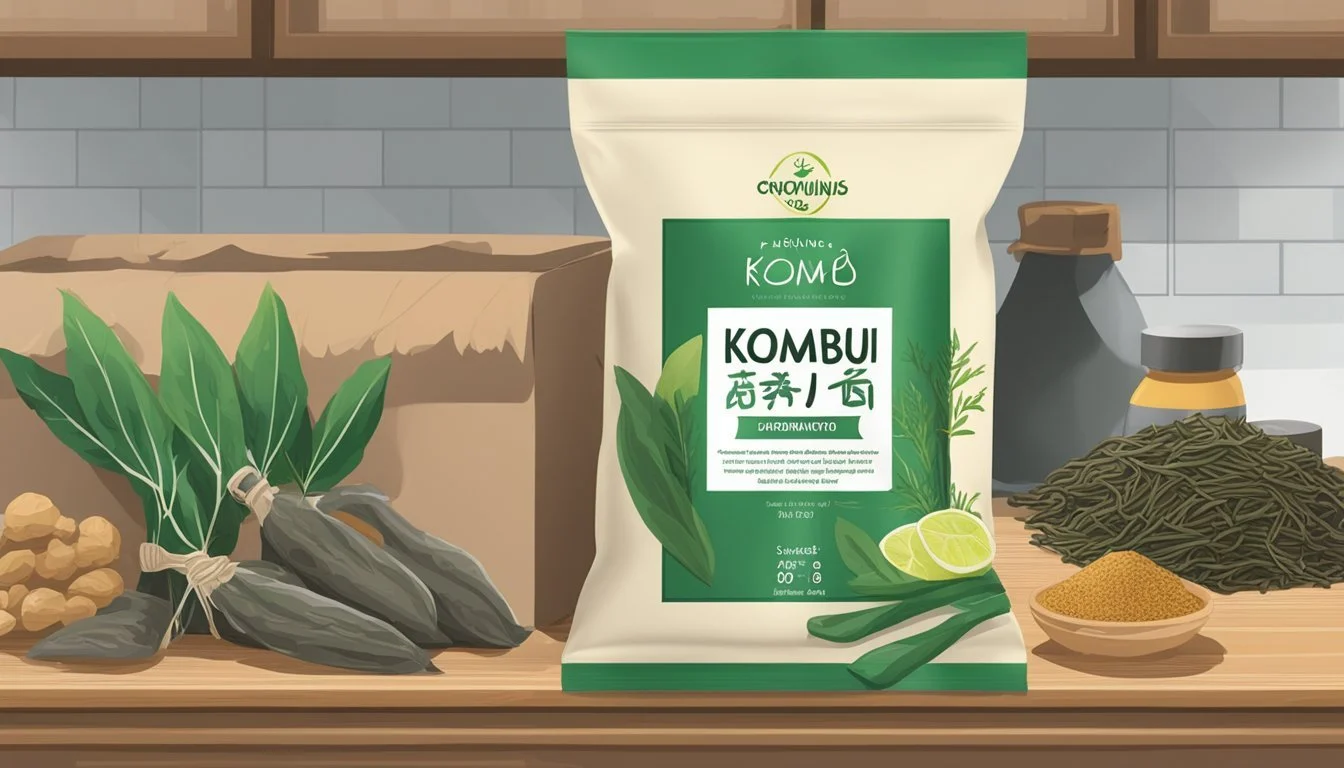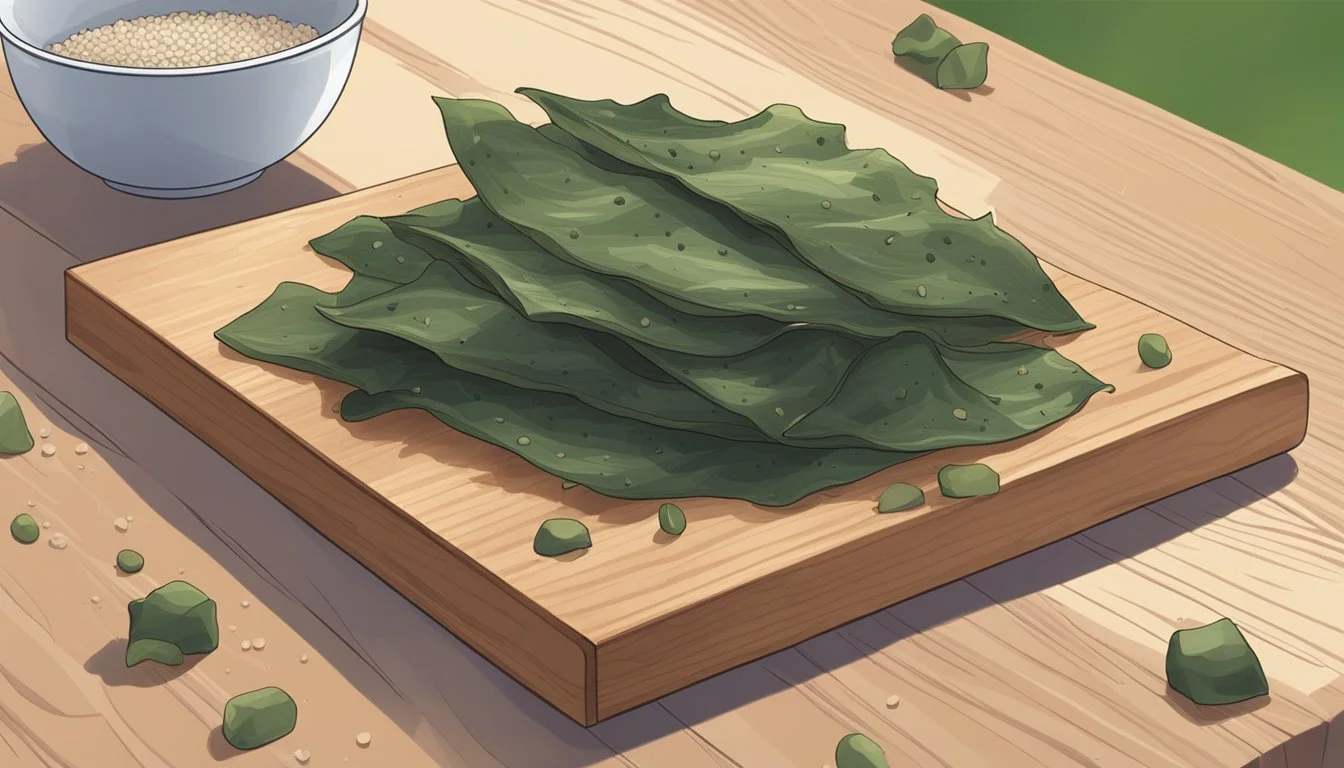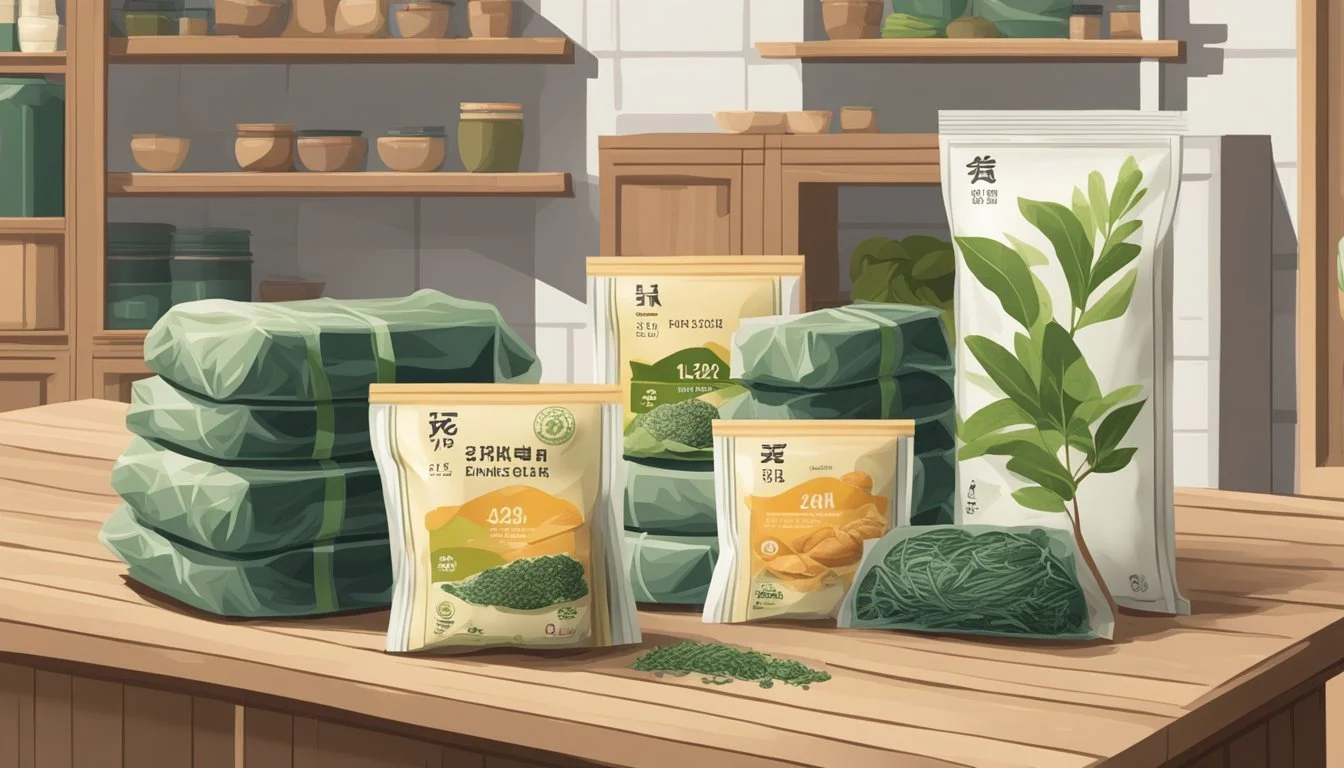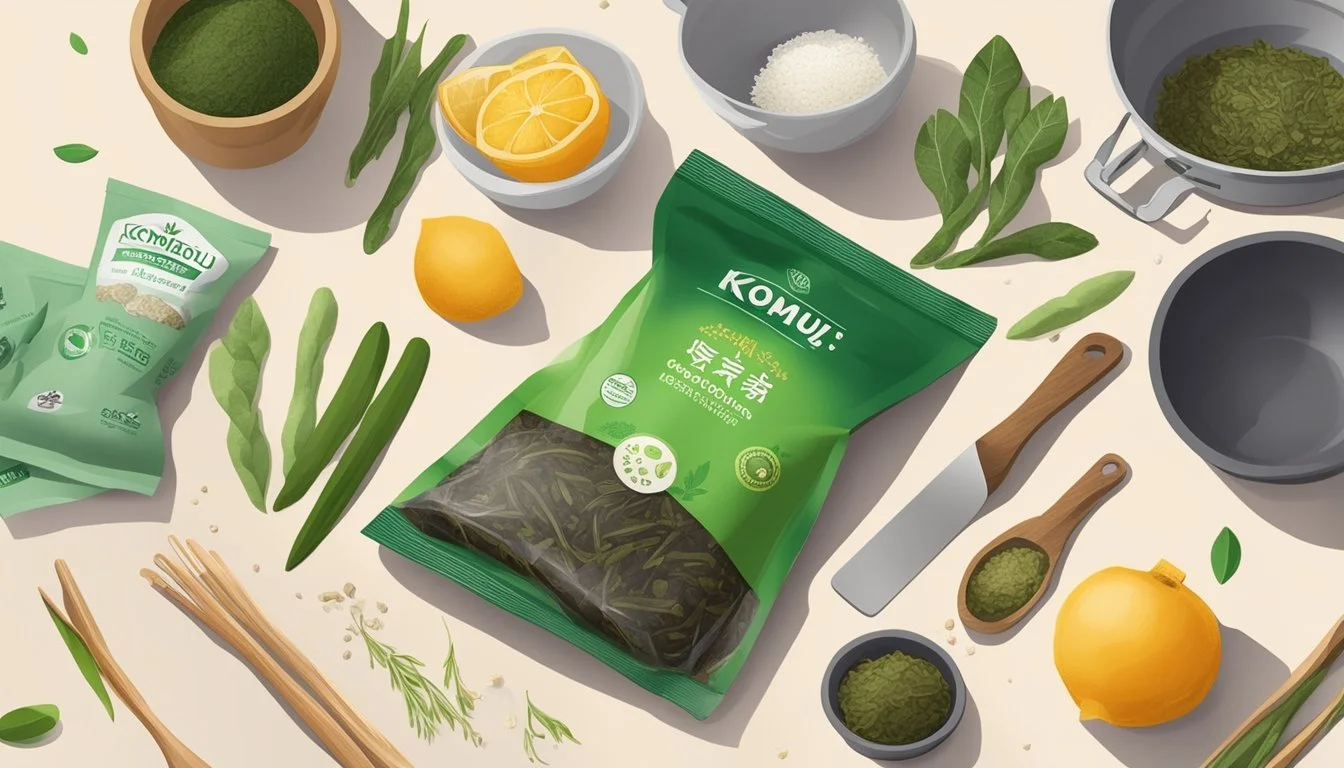Does Kombu Expire?
Understanding Shelf Life and Storage Tips
Kombu, a type of edible kelp, is a staple in many kitchens, especially for those who enjoy Japanese cuisine. Like other dried seaweeds, it comes with a long shelf life. Unopened dried kombu can last between 18 to 24 months if stored properly, which is significantly longer than many other pantry items.
It's important for users to store kombu in a cool, dry place to maintain its quality. Over time, even dried kombu can show signs of spoilage, such as becoming brittle or emitting a musty odor, indicating it may no longer be suitable for use.
Despite its durability, it's wise to check for any changes in texture or smell before using kombu from an old package. Fresh kombu has a subtle oceanic scent, so any off-smell should prompt caution. Adding this simple check can ensure that dishes retaining the authentic flavors and health benefits kombu offers.
Understanding Kombu
Kombu is a type of edible kelp commonly used in Japanese cuisine. This sea vegetable is known for its rich umami flavor, which adds depth to various dishes.
Kombu contains a wealth of minerals, including iodine, calcium, magnesium, potassium, and dietary fiber. These nutrients contribute to its health benefits, making it a valuable addition to a balanced diet.
Varieties of Kombu:
Rishiri Kombu: Known for its strong flavor and used primarily for soups.
Rausu Kombu: Considered one of the best for making dashi broth.
The key component responsible for kombu's umami taste is glutamic acid. When simmered in water, kombu releases this amino acid, enhancing the savory taste of broths and soups.
Kombu can be prepared in multiple ways. It is often:
Used to make broths like dashi.
Added to soups, such as miso or noodle soup.
Roasted and used as a condiment.
Proper storage is crucial to maintain kombu's quality. It should be kept in a cool, dry place, away from direct sunlight, usually in an airtight container. This ensures it retains its characteristics for up to a year. Regularly inspecting kombu for signs of spoilage, such as mold, changes in color, or off odors, is essential to ensure it remains safe and flavorful for consumption.
Kombu Preservation Basics
Kombu, a type of edible kelp, requires proper storage to maintain its quality and extend its shelf life. It is essential to understand the factors that impact its longevity, how to identify spoilage, and the best storage practices.
Shelf Life Factors
Kombu can last a long time if stored correctly. Dried kombu typically has a shelf life of up to a year when kept in ideal conditions. Key factors influencing its shelf life include moisture, light, and temperature.
Moisture is a primary concern, as it can lead to mold growth and spoilage. Keeping kombu dry is vital for preserving its freshness. Light and high temperatures can degrade kombu’s quality and reduce its shelf life. It is advisable to store it in a cool, dry place, away from direct sunlight.
Signs of Spoilage
Even though kombu has a long shelf life, it can still spoil if not stored properly. Visual and olfactory cues are the best indicators of spoilage. Look for signs like discoloration, a stale odor, or the presence of mold.
Kombu that has turned from its typical dark green to a lighter shade or has white spots may be contaminated. Mold is a clear indicator of spoilage and should not be consumed. Kombu that smells off or stale has likely lost its umami flavor and should be discarded to ensure safety.
Storage Recommendations
To extend the shelf life of kombu, proper storage is crucial. Use an airtight container to protect kombu from moisture and air exposure. Alternatively, seal it in a resealable bag, ensuring to remove excess air before sealing tightly.
Refrigerating kombu is beneficial for longer storage. Place the kombu in a freezer-safe bag, remove air, and seal it to protect against freezer burn. Label the bag with the date of storage to track its freshness. Vacuum sealing is another effective method for long-term preservation.
These storage practices help maintain the kombu's quality and ensure it remains safe for consumption. The key is keeping kombu in a dry, cool, and dark place, whether it is in the pantry or the refrigerator.
Kombucha and Fermentation
Kombucha, a popular fermented tea, is made using a combination of tea, sugar, and a symbiotic culture of bacteria and yeast (SCOBY). The fermentation process not only imparts unique flavors but also contributes to its probiotic content, which is a key point of interest for many.
Fermentation Essentials
The fermentation process for kombucha begins with the brewing of sweetened tea. The SCOBY, a rubbery, jelly-like substance, is introduced into this tea, initiating fermentation. This culture contains beneficial bacteria and yeast. The yeast ferments the sugar into alcohol, which is then converted by the bacteria into various acids, including acetic acid, contributing to the characteristic tang.
Maintenance of a refrigerated environment is crucial in controlling the fermentation rate, ensuring that the kombucha remains palatable. Live cultures within the kombucha can be preserved for an extended period, with minimal changes to its properties, if stored properly. This careful regulation of temperature and time ensures that kombucha retains its health benefits without degrading.
Fermented Tea Characteristics
Kombucha’s fermented nature gives it a variety of distinct characteristics. Chief among these is its tangy taste and slight effervescence. Over time, if left unrefrigerated, kombucha can turn increasingly vinegary due to the ongoing fermentation, eventually transforming into a kombucha vinegar of sorts.
The probiotic content stemming from the live cultures in fully fermented kombucha is another highlight. These probiotics are believed to aid gut health and maintain a balanced microbiome. It’s important to note that while kombucha may grow more acidic over time, the presence of visible mold is a clear indicator of spoilage, rather than changes in taste or acidity levels.
Health Benefits and Nutritional Value
Kombu offers a range of health benefits due to its high nutrient content and positive impact on gut health. Its dense concentration of vitamins and minerals makes it a valuable addition to any diet.
Kombu Nutrition
Kombu is rich in several key vitamins and minerals. It has high levels of iodine, supporting thyroid function and hormone production. Additionally, it contains vitamins B1 and B2, known for relieving fatigue and enhancing mental clarity.
The seaweed is also a good source of calcium, which is crucial for bone health across all age groups. Its content of vitamin C boosts the immune system, and iron in kombu supports healthy blood cells. Combining kombu with other nutritious foods can amplify its benefits in a balanced diet.
Probiotics and Gut Health
Kombu helps promote gut health by supporting the growth of beneficial probiotics. When soaked and prepared correctly, kombu releases compounds that can make the gut environment favorable for these helpful bacteria.
Fermented foods incorporating kombu can introduce natural probiotics into the digestive system. This can enhance digestion and nutrient absorption. Additionally, kombu's dietary fiber aids in maintaining bowel regularity and overall digestive well-being.
Including kombu in meals can be a simple yet effective way to add both nutrition and gut-friendly elements to the diet.
Storing Homemade and Store-Bought Varieties
Effective storage practices can significantly affect the quality and longevity of both homemade and store-bought kombu and kombucha. Proper storage conditions can maximize shelf-life and maintain optimal flavor and benefits.
Homemade Kombu and Kombucha
Homemade kombu should be stored in a cool, dry place, away from direct sunlight. An airtight container is ideal for preventing moisture and contaminants. Properly stored, dried kombu can last up to a year.
For homemade kombucha, it is best to keep it in the refrigerator. Once fermentation is complete, transferring the kombucha to airtight bottles can help retain its carbonation. Consuming it within a week of refrigeration ensures the best flavor and probiotic content, though it can last longer with some loss of effervescence.
Commercial Products and Longevity
Store-bought kombu and kombucha come with labeled shelf-lives. Unopened, store-bought kombu remains good for up to a year if kept in a cool, dry place.
Commercial kombucha, when refrigerated and unopened, generally lasts from 1 to 2 months. Once opened, refrigerating it and consuming it within a week is crucial for maintaining its quality. It's important to note that correctly sealed and stored kombucha may last longer, but its carbonation and flavor profile could change.
Using a dark, cool place like a wine cellar can further extend the longevity of store-bought kombucha. Keeping it airtight prevents accelerated expiration due to exposure to air.
Proper storage practices for both homemade and commercial products are essential for sustaining their quality and benefits.
Consumption Safety and Spoilage Indicators
Knowing how to identify fresh kombu and recognize kombucha spoilage is crucial for ensuring safe consumption. This section will provide clear guidelines on these topics to help you determine the quality and safety of these items.
Identifying Fresh Kombu
Fresh kombu typically has a consistent dark green to brown color with a slightly glossy appearance. Good quality kombu is dry and brittle. If the kombu is stored correctly—ideally in a cool, dry place away from direct sunlight in an airtight container—it can last up to a year.
Spoilage indicators for kombu include a strong, unpleasant odor, noticeable mold growth, or a slimy texture. Proper storage conditions are essential to maintain its quality and extend its shelf life. If you notice these signs, it's safest to discard the kombu.
Recognizing Kombucha Spoilage
Kombucha has a tangy, slightly sweet taste when fresh. It can last 1 to 3 months after bottling if prepared, bottled, and stored properly. However, after the "best before" date, its flavor and living culture content might change.
Signs of spoilage include a strong vinegar-like odor, overly tart taste, and visible mold growth. If sediments are present, that can be normal, but discolored or unusual sediments may indicate spoilage. Always inspect the kombucha for any noticeable changes before consuming. If in doubt, it's better to err on the side of caution and avoid drinking it.
Culinary Applications and Alternatives
Kombu is a versatile seaweed used in various culinary applications, significantly influencing taste and texture. From enhancing broths with umami to acting as a vinegar substitute, kombu offers several practical benefits.
Dashi Broth and Umami
Kombu is integral to preparing dashi broth, a cornerstone of Japanese cuisine. It imparts a unique umami flavor, enhancing the overall taste of soups and sauces. To make dashi, kombu is typically steeped in water and simmered gently.
The result is a flavorful, nutrient-rich broth important in dishes like miso soup and ramen. The key is to remove the kombu before the water boils to avoid a bitter taste, ensuring the broth retains its subtle, oceanic essence.
Vinegar Substitute and Flavoring
Kombu can also serve as a vinegar substitute, adding complexity to dishes. It imparts a mild, tart taste and subtle effervescence, similar to that of vinegar. This makes kombu useful in pickling vegetables or seasoning rice.
Its texture after soaking becomes soft, allowing it to be sliced and added directly to salads or stir-fries. In addition to enhancing flavor, it provides a unique mouthfeel that distinguishes it from other seaweeds and seasonings.
Beverage Variants and Related Products
Kombu, beyond its culinary uses, plays a role in various beverages. These include fermented drinks and specific teas and infusions.
Fermented Drink Types
Kombu is often used in fermented drinks, contributing to their unique flavors and health benefits. Kombucha, a well-known fermented tea, often incorporates kombu to enhance its mineral content and umami flavor. Fermentation helps preserve the kombu and infuses the drink with beneficial probiotics.
Another fermented beverage that can incorporate kombu is water kefir. This lightly carbonated soda-like drink benefits from the added nutrients of kombu, making it both refreshing and nutritious. The seaweed's natural salts and minerals can help stimulate the fermentation process, ensuring a robust drink.
Kombu Tea and Infusions
Kombu tea, also known as kombucha cha in Japan, is a simple infusion made by steeping dried kombu in hot water. This tea is valued for its subtle umami flavor and is often consumed for its purported health benefits, including improved digestion.
Aside from kombu tea, kombu-infused broths or dashi are popular in Japanese cuisine. These broths form the basis for soups but can also be sipped as a nutritious beverage. The infusion process extracts essential minerals and amino acids from the kombu, making it a restorative drink.
Using kombu in tea and infusions is straightforward. Simply soak a piece of dried kombu in hot water for several minutes. Adding a bit of soy sauce or a slice of ginger can enhance the flavor profile.
Combining kombu with different beverages not only enriches their taste but also adds valuable nutrients, making kombu an important ingredient in various drink preparations.







